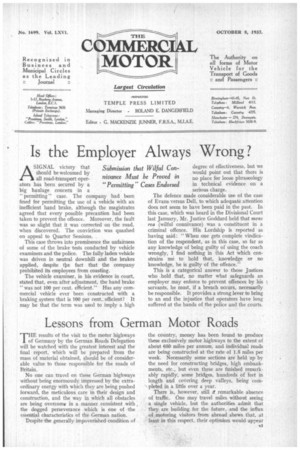Is the Employer Always Wrong ?
Page 35

If you've noticed an error in this article please click here to report it so we can fix it.
ASIGNAL victory that should he welcomed by. all road-transport operators has been secured by a big haulage concern in a " permitting " case. The company had been fined for permitting the use of a vehicle with an inefficient hand brake, although the magistrates agreed that every possible precaution had been taken to prevent the offence. Moreover, the fault was so slight that it was corrected on the road, when discovered. The conviction was quashed on appeal to Quarter Sessions.
This case throws into prominence the unfairness of some of the brake tests conducted by vehicle examiners and the police. The fully laden vehicle was driven in neutral downhill and the brakes applied, despite tbe fact that the company prohibited its employees from coasting.
The vehicle examiner, in his evidence in court, stated that, even after adjustment, the hand brake
■ ■
was not 100 per cent. efficient." Has any commercial vehicle ever been constructed with a braking system that is 100 per cent., efficient? It may be that the term was used to imply a high degree of effectiveness, but we would point out that there is no place for loose phraseology in technical evidence on a serious charge.
The defence made considerable use of the case of Evans versus Dell, to which adequate attention does not seem to have been paid in the past. In this case, which was heard in the Divisional Court last January, Mr. Justice Goddard held that limns yea (wilful connivance) was a constituent in a criminal offence. His Lordship is reported as having said : "When one gets complete vindication of the respondent, as in this case, so far as any knowledge of being guilty of using the coach wrongly, I find nothing in this Act which constrains me to hold that, knowledge or no knowledge, he is guilty of the offence."
This is a categorical answer to those Justices who hold that, no matter what safeguards an employer may enforce to prevent offences by his servants, he must, if a breach occurs, necessarily be responsible. It provides a strong lever to bring to an end the injustice that operators have long suffered at the hands of the police and the courts.




























































































